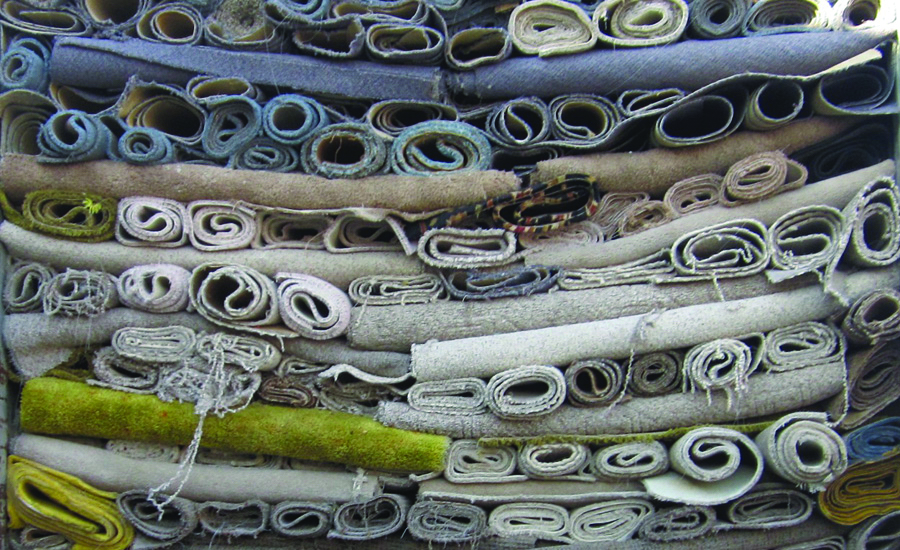March 2/9, 2020: Volume 35, Issue 18
By Ken Ryan

Barring a last-minute change, New York State is on the verge of enacting legislation that would require all carpet and carpet pad sold in New York to be diverted from landfills and recycled. Most troubling to carpet mills and industry stakeholders is there is no current infrastructure in place in New York to recycle post-consumer carpet.
“This is a big deal, and time is really of the essence here,” Joe Yarbrough, president of the Carpet & Rug Institute (CRI), told FCNews, speaking on behalf of the carpet industry.
At press time, the proposal was with the two branches in New York government—the Assembly and the Senate. Because Gov. Andrew Cuomo and the branches are controlled by Democrats, the proposal will be difficult to defeat.
While there is an industry rush to defeat this legislation, talk of a carpet recycling program in New York is not new. In the past, Sen. Brian Kavanaugh (D), who represents Lower Manhattan and parts of Brooklyn, has introduced legislation—an amendment to the state’s environmental conservation law—to establish a carpet stewardship program; his bill would require manufacturers to coordinate with wholesalers, retailers and installers to recycle old carpets. It would levy penalties for noncompliance.
Section 1, article iii of his proposal reads: “Carpet was one of the few products listed by the New York State department of environmental conservation as most suited to a stewardship approach based on research and feedback from stakeholders.”
Speaking for the industry, Yarbrough said their position would be to oppose this legislation “as this could affect our entire industry. We’re trying to make the governor’s office, the legislative bodies aware of the unintended consequences of what perhaps is deemed as well-intentioned efforts by some.”
Key requirements:
- All carpet and pad must be diverted from landfills and recycled.
- All of the costs to build a recycling infrastructure, collect used carpet, find outlets for recycled carpet and ensure diversion from landfills, including costs of state government oversight, must be paid by the product manufacturers.
- The industry can use a stewardship organization to run the program, but manufacturers are on the hook for the compliance and for any penalties for noncompliance.
- Penalties for noncompliance can reach $10,000 per day.
This mandatory carpet and pad stewardship program would:
- Enforce a $1,000 per day penalty on any flooring retailer failing to comply.
- Allow the state government to determine each year the amount of carpet and pad required to be recycled.
If enacted, this would be the first Extended Producer Responsibility (EPR) law requiring manufacturers to bear all costs of the program. Jay Hagan, senior director of national accounts for Mohawk Residential, said he fears the New York legislation could lead to other states passing similar laws.
Joe Foye, deputy general counsel for Mohawk Industries, reached out to FCNews on this subject. “In general—not specific to Mohawk—our recourse is to attempt to defeat this legislation. If the legislation passed in its current form, Mohawk and other manufacturers, as well as the retailers, will need to individually assess whether they will comply with the requirements or elect not to sell carpet and pad products in New York.”
The flooring industry has fully engaged professional lobbyists in New York to help fight this proposal. Industry members are engaging respective New York customers to send letters and lobby key members of the New York legislature to fight this proposal.
All New York retailers received a letter from Mohawk outlining the onerous burden it would have on the carpet industry in New York. The letter said, in part: “This proposed carpet recycling program will directly and adversely impact your business. The industry experienced more than a 20% decline in carpet sales since similar California carpet legislation was passed. As this proposal requires the industry to bear all costs, the price of carpet and pad sold into New York will dramatically escalate if this is made into law. We need your help to fight this damaging proposal.”
Ben Case, co-owner of The Carpet Exchange, Lockport, N.Y., said that while he is all for environmental responsibility, he believes this legislation was hastily put together. “My problem with it is that it’s a snap decision; there is no scale or timeline for the program to be implemented. My understanding is that it will be immediate.”
While the producer bears the cost, that cost will be passed on to the consumer and will hurt a category that is already losing share. “And carpet is my No. 1 profit category,” Case said.
